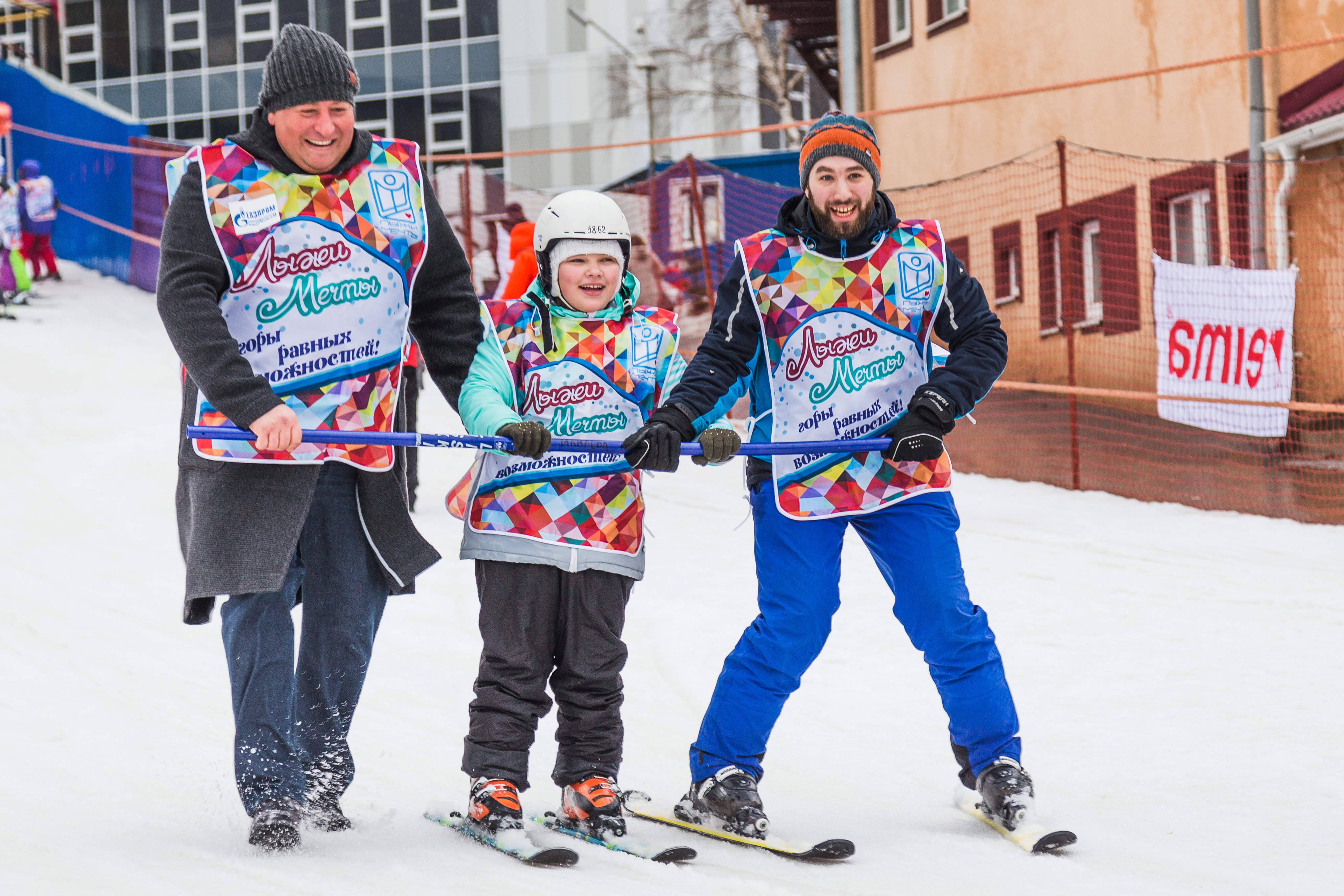Skis remove limitations

By Angelina Davidova
Kommersant
How a skiing rehabilitation program works for people with disabilities
In 16 regions of Russia, the “Ski Dreams” programmes help the rehabilitation of children and adults with severe disabilities. Experienced instructors teach skiing to hundreds of children with serious illnesses, many of whom could hardly even walk. In Russia, where the issue of rehabilitation and socialization of people with disabilities remains highly acute, the project is truly unique.
After her daughter, Alice, was diagnosed with infantile cerebral paralysis Maria Tsvetkova, “literally lived in hospitals” in Moscow and regularly attended rehabilitation courses in the Czech Republic and in Slovakia. Last year, the family decided on a new type of rehabilitation – the “Ski Dreams” programme. “Alice started to walk with her heels, her gait and movements became steadier. The courses are not exhausting, this is more like a pleasant and interesting exercise. Alice, who is now six years old, waits with great impatience for her next training session and deeply trusts and listens to her instructors!” says her mother.
According to data from the Russian Federal State Statistics Service, in 2015 there were 12,450,000 disabled people in the Russian Federation and the number of children with disabilities was 604,000. According to various estimations, out of 1,000 new-born children in Russia, 4.2–4.7 per cent are born with cerebral paralysis and other paralytic syndromes.
The “Ski Dreams” programme, which was developed by an autonomous non-commercial organization, provides skiing lesson for adults and children with physical and mental disabilities. “Skiing, with the assistance of qualified staff within a framework of specially created programmes and equipment, allows the process of treatment, rehabilitation, and socialization to be significantly accelerated for all categories of people with congenital and acquired health limitations on the neurological spectrum, starting from the age of three,” says Julia Gerasimova, the programme coordinator.
“Leo does not perceive “Ski Dreams” as rehabilitation – here, we walk, play and communicate. The rehabilitation is unnoticeable and painless and we don’t have to make him go to the training sessions. Each time, we notice that his movements become more confident, his back is straighter and his self-esteem is growing,” says Ekaterina Yudina, mother of 13-year-old Leo Yudin from Izhevsk, who only started to participate in the programme in February 2016.
According to testimonies of the “Ski Dreams” organization, the programme improves the participant’s condition. After two or three weeks of training, the motor functions of patients with infantile cerebral paralysis improves, children with autism spectrum problems actively begin to communicate with others, there were even cases when non-verbal children with autism spectrum disorders developed speech. The programme has already been supported by the “Scientific and Practical Center for the Medical and Social Rehabilitation of Invalids” of the Moscow City Department for Social Protection, where the scientific assessment of the programme is conducted under the direction of Dr Svetlana Olovets.
Nevertheless, the project only started two years ago, in January 2014, when the actor and TV host, Sergey Belogolovtsev, and his journalist wife, Natalya, created the “Ski Dreams” programme in Moscow. Their son, Evgeniy, has been living with infantile cerebral paralysis for 26 years and did not walk for the first six years of his life. The family tried various rehabilitation methods, including a skiing programme in the US which unexpectedly proved to be the most effective. Skiing sports rehabilitation programmes for people with disabilities have been functioning in the US, Canada, and Australia for more than 30 years, so Sergey and Natalya Belogolovtsevi decided to create the first similar project in Russia. “Our experience demonstrates that skiing rehabilitation programmes are particularly effective for people with musculoskeletal system impairments (infantile cerebral paralysis, consequences of spinal traumas, brain injuries), with autism, Down syndrome, as well as partial or full absence of sight and hearing,” says the organization.
The programme currently operates in 16 regions of Russia, from Moscow to the Udmurt Republic and from the Ryazan region to Krasnoyarsk Krai. In total, more than 3,000 people between the ages of three and 62 have undergone rehabilitation. In addition to actual rehabilitation programmes, “Ski Dreams” also trains certified instructors and volunteers. The programme is operated along the lines of a social franchise: A public organization, “Ski Dreams,” prepares instructors through its programmes, manufactures equipment under its control, and sells this equipment to ski resorts, performing quality and quantity monitoring of the services provided.
Parents pay for the programme themselves, or in cases of hardship they can receive a grant from the programme’s sponsors – private donors or commercial companies. The Siberian coal energy company, for example, supported the opening of a special rehabilitation centre in the Kemerovo region. In many cities, the projects are sponsored by the owners of ski slopes. In Moscow, two sessions per week cost around 3,000 Russian Rubles (US$ 50) with one instructor or 6,000 Rubles (US$ 100) with two instructors. In other cities and regions, the prices are lower. In comparison – according to the organization – one day in the outpatient centre of the Ministry of Social Development in Moscow costs about 5,000 Rubles (US$ 75).
According to the programme coordinator, Julia Gerasimova, “Ski Dreams” is trying to obtain government financing. “We really would like the programme to receive medical status because its effect is obvious and perhaps it has already been prescribed in individual rehabilitation programmes,” says Maria Tsvetkova, mother of six-year-old Alice.
The organization plans to increase the number of centres and to create a medical analysis system to measure the efficiency of the programme, and “Ski Dreams” is searching for new funds and investors to expand the programme, design new rehabilitation methods and improve existing ones. “The absence of targeted funding for the programmes development remains one of the most pressing issues. We hope to attract the attention of potential business angels who could help with this,” says Julia Gerasimova.
